

Conjunctions: and, or, but, so, because and although. Daisy: Are you and Alfie going to the festival this weekend?
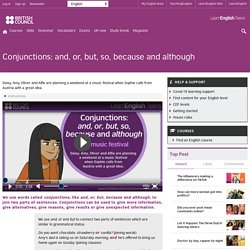
Oliver: Hmm? We want to, but we don't have a car so we're not sure how to get there. It's in the middle of nowhere! Daisy: Amy's dad is taking us on Saturday morning, and he's offered to bring us home again on Sunday. Why not come with us? How to help English learners use linking expressions. Would you like to help your learners speak more coherently?
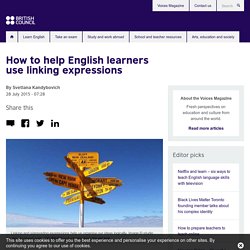
Svetlana Kandybovich, the latest winner of the British Council’s Teaching English blog award for a post on speaking skills, suggests some useful classroom activities. Learning to speak a language might seem fairly straightforward in principle: first you learn the words, then you form sentences using the correct grammar, finally you string the sentences together. Voilà! – you’re fluent. However, the formula 'grammar + vocabulary' is not enough to become a competent speaker of English (or any other language). Even when learners can make themselves understood, and use correct grammar and vocabulary, you often get the nagging feeling that something is missing from their conversation. The importance of coherence We get the sense that a text (spoken or written) is generally coherent when it makes sense through the organisation of its content. Just as with any skill, the ability to organise what you say into a whole can be taught.
Speaking practice tests. In the Speaking test, you will have a discussion with a certified examiner.
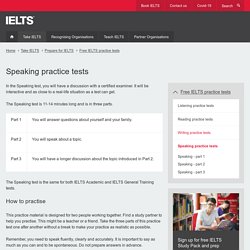
It will be interactive and as close to a real-life situation as a test can get. The Speaking test is 11-14 minutes long and is in three parts. The Speaking test is the same for both IELTS Academic and IELTS General Training tests. How to practise This practice material is designed for two people working together. Remember, you need to speak fluently, clearly and accurately. Speaking tips and advice. Broaden your speaking abilities by looking at different forms of media such as radio, TV, online discussions and social conversations.
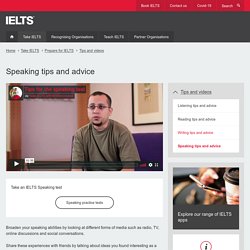
Share these experiences with friends by talking about ideas you found interesting as a way of practicing your spoken English. Stretch your abilities Speaking practice with a friend or colleague whose English is at a higher level than yours allows you to learn by listening and develop your own skills by responding. Make sure the difference between your English level and theirs is not too great or you may become discouraged. Repetition with understanding A great way to build confidence is to watch very short conversations, speeches, or discussions and then, once you are sure that you have understood what was being said, repeat them.
Start off with very short simple extracts and then increase the length and difficulty slowly – making sure that pronunciation aspects such as stress, rhythm, and intonation are as accurate as possible. The danger of learning speeches. IELTS. Typical speaking tasks. English Vocabulary. General English - Audio zone. Listening. English Skills - Listening. Speaking practice tests. Short courses on FutureLearn. Pronunciation. English speaking skills practice. 5 useful tips and tools for social learning - FutureLearn. FutureLearn’s Head of Community, David Thair, shares his top five tips for getting the most out of our social learning features.
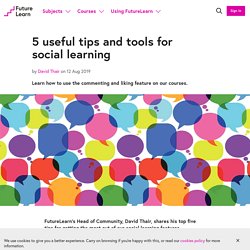
At FutureLearn, learning through conversation is important to us. That’s why you can leave comments and have a conversation on almost every step of our courses. Just scroll to the bottom of a step, or press the comments link. If you’re new to FutureLearn or to social learning, making sense of lots of comments might seem like a lot to manage. Here are a few tips to help you feel at home. 1. Your FutureLearn profile is what other learners can see about you when you interact with them on a course. If you haven’t already, you should add some information to your FutureLearn profile–just like our example learner above.
Your profile can only be seen by logged in learners. Moodle. Any owner or user of a FutureLearn account must be at least 13.
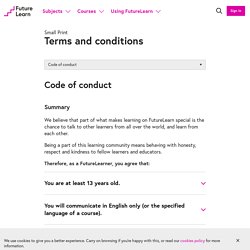
If you are the parent or guardian of a child under the age of 13 and wish to use a FutureLearn course to help with their education (e.g. homeschooling), you should use your own FutureLearn account to work through the materials with them, and take part in any conversations as yourself. Read more about child safety on FutureLearn. This is because communicating with lots of people becomes very difficult if everyone comments in a different language. Some courses are available in languages other than English. On those courses, only the appropriate language should be used. IELTS test format. Test format – Academic Writing 60 minutes Topics are of general interest to, and suitable for, test takers entering undergraduate and postgraduate studies or seeking professional registration.
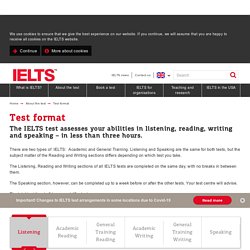
There are two tasks: Task 1 - you will be presented with a graph, table, chart or diagram and asked to describe, summarise or explain the information in your own words. You may be asked to describe and explain data, describe the stages of a process, how something works or describe an object or event. IELTS Academic Writing description IELTS Academic Writing in detail. Speaking band descriptors.